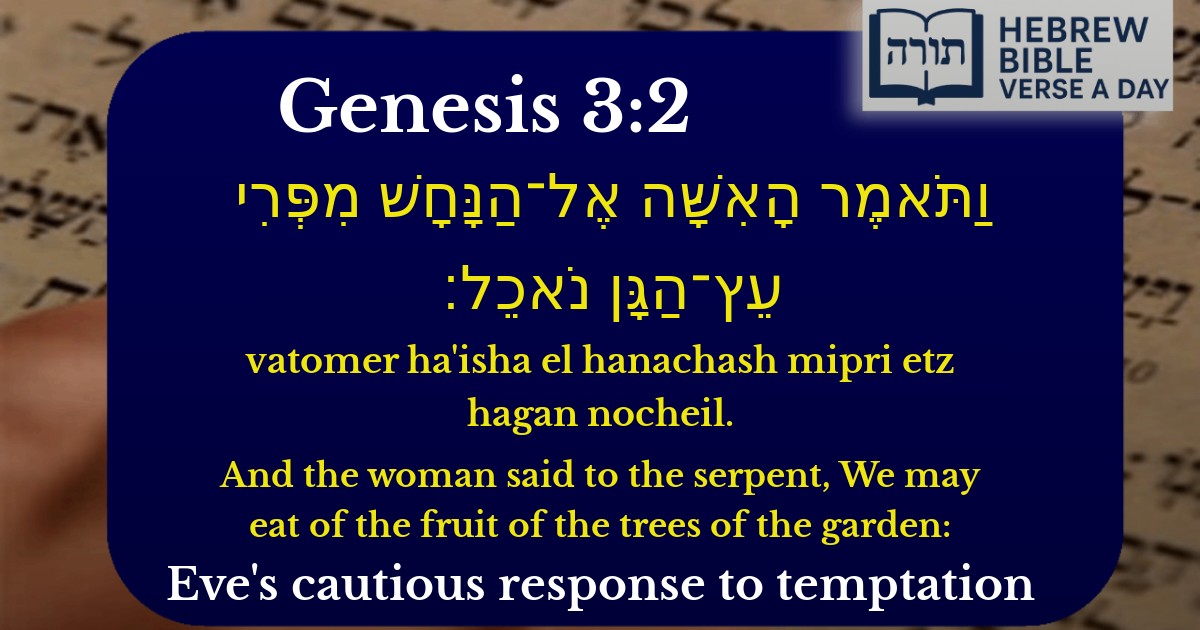Frequently Asked Questions
Q: What does Genesis 3:2 mean when Chava (Eve) says 'We may eat of the fruit of the trees of the garden'?
A: In Genesis 3:2, Chava is responding to the serpent's question about the forbidden fruit. Rashi explains that she accurately quotes Hashem's command (from Genesis 2:16) that they were permitted to eat from the trees of the garden, except for the Tree of Knowledge. Her response shows she understood the boundaries set by Hashem, though the serpent would soon tempt her to transgress them.
Q: Why is Chava's conversation with the serpent important in the Torah?
A: This conversation marks the beginning of the first test of human free will. The Midrash (Bereshit Rabbah 19:4) teaches that the serpent intentionally engaged Chava in dialogue to lead her toward sin. This episode establishes the concept of temptation and the consequences of disobeying Hashem's commandments, fundamental themes throughout Torah.
Q: What lesson can we learn from Genesis 3:2 about how to respond to temptation?
A: The verse teaches us to be precise in our knowledge of mitzvot and firm in upholding them when faced with temptation. Chava initially states the prohibition correctly, but the Talmud (Sanhedrin 29a) notes that adding to or subtracting from Hashem's exact words (as Chava does in the next verse by adding 'nor shall you touch it') can lead to transgression. We learn to adhere strictly to halacha without adding or diminishing.
Q: How does the serpent's approach to Chava in Genesis 3:2 relate to everyday challenges?
A: The Rambam (Hilchot De'ot 2:1) teaches that the serpent's method - starting with casual conversation before introducing improper ideas - mirrors how negative influences often operate. This reminds us to be mindful of conversations and influences that may gradually lead us away from proper conduct, and to strengthen our commitment to Torah values in all interactions.
Q: Why does the Torah specify that Chava spoke to the serpent?
A: The Talmud (Sotah 9b) explains that the serpent was considered the most cunning of creatures, and Chava's engagement with it demonstrated human vulnerability to persuasion. This teaches that we must be especially cautious when dealing with clever arguments that might challenge Torah principles, and to seek proper Torah guidance when facing sophisticated challenges to our beliefs.


Rashi's Explanation
Rashi (Bereshit 3:2) notes that Chava (Eve) added to Hashem's original command when speaking to the serpent. Hashem had said they may eat from all trees except the Tree of Knowledge (Bereshit 2:16-17), while Chava said "from the fruit of the trees of the garden we may eat," implying some restriction even before mentioning the forbidden tree. This addition, according to Rashi, created an opening for the serpent to challenge her.
Midrashic Interpretation
The Midrash (Bereshit Rabbah 19:3) explains that the serpent observed Chava distancing herself from all trees after touching the Tree of Knowledge (which had not yet been forbidden to touch). Seeing this, the serpent pushed her into the tree, saying: "Just as there's no death in touching it, so too there's no death in eating from it." This demonstrates how the serpent exploited Chava's added stringency to mislead her.
Rambam's Philosophical Perspective
In Moreh Nevuchim (1:2), Rambam explains that this episode demonstrates humanity's unique intellectual capacity and free will. The serpent represents the imaginative faculty that can lead one astray from intellectual truth. Chava's addition to the command shows how human reasoning can distort divine instructions when not properly guided by wisdom.
Ibn Ezra's Linguistic Insight
Ibn Ezra notes that Chava's phrasing "מִפְּרִי עֵץ־הַגָּן" ("from the fruit of the trees of the garden") uses the singular "fruit" with the plural "trees," suggesting she was already focusing on the specific fruit of the Tree of Knowledge, despite it being only one among many permitted trees.
Kli Yakar's Moral Lesson
The Kli Yakar (Bereshit 3:2) teaches that Chava's mistake was in viewing the garden's bounty as something they were merely permitted to eat ("נֹאכֵל") rather than as gifts generously provided by Hashem. This attitude of entitlement rather than gratitude made her vulnerable to the serpent's temptation.
Chasidic Interpretation
The Sefat Emet explains that the serpent's question (preceding this verse) and Chava's response represent the constant test of bechira (free will). By engaging in dialogue with the serpent rather than immediately rejecting its approach, Chava allowed the yetzer hara (evil inclination) to gain a foothold in her consciousness.